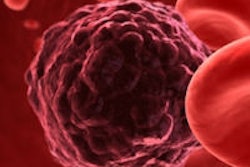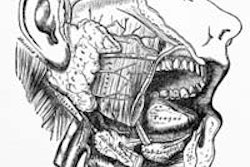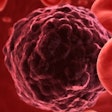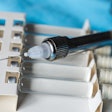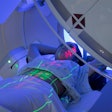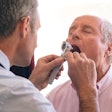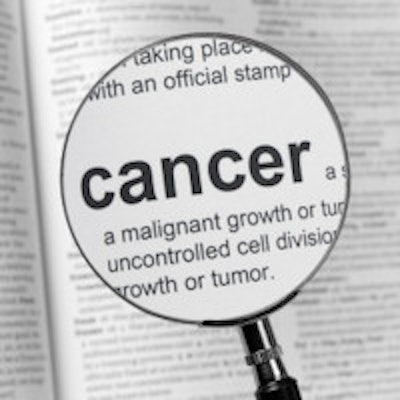
Esophageal cancer is relatively rare cancer that is growing in occurrence; early detection of the cancer could improve the survival rates for patients diagnosed with this disease. Now, an international research team has developed and validated a four-protein serum biomarker panel that might do just that. Their findings were outlined in Cancer (August 5, 2014), a journal of the American Cancer Society.
The four-protein panel, called B-AMP (biglycan, myeloperoxidase, annexin-A6, and protein S100-A9), is a simple, noninvasive, low-cost blood test, that identified esophageal cancer with a high classification accuracy of 87% in the study.
 Blair Jobe, MD, director of the Allegheny Health Network's Esophageal and Thoracic Institute. Image courtesy of the Allegheny Health Network.
Blair Jobe, MD, director of the Allegheny Health Network's Esophageal and Thoracic Institute. Image courtesy of the Allegheny Health Network.The discovery is a step forward in the early detection and the management of esophageal cancer, according to lead researcher Blair Jobe, MD, director of the Allegheny Health Network's (AHN) Esophageal and Thoracic Institute. The test is already being used at the institute in a clinical trial setting to monitor the course of esophageal cancer.
"Esophageal cancer patients often have few options available to fight this disease, and five-year survival rates are extremely low, at about 15%," Dr. Jobe stated in a press release. "We've made progress in treating and monitoring patients with conditions that can progress to esophageal cancer, such as gastroesophageal reflux disease (GERD), Barrett's esophagus, and high-grade dysplasia. Yet only a small minority of these patients develop life-threatening esophageal cancer. Better detection techniques are needed."
The incidence of esophageal cancer is rapidly rising; according to the incidence rates are about 600% higher than in the 1970s. Survival is better when the disease is detected early, but most patients do not sense difficulty swallowing until a tumor is advanced.
"We are excited and very optimistic about how this biomarker panel could be used to help patients, from early detection in at-risk patients, to risk monitoring for patients with conditions that may lead to esophageal cancer, to monitoring the disease course in patients with cancer," said Ali Zaidi, MD, the research director at the AHN Esophageal and Thoracic Institute.
While the development of blood-based biomarkers has improved early detection and treatment of ovarian and prostate cancers, for instance, the development of such biomarkers for esophageal cancer has been slowed by the difficulty in identifying a universal tracking marker.
Biomarkers with established relevance in esophageal cancer progression sequence (from tissue data) were chosen for testing in the serum. Using novel mathematical modeling, Dr. Jobe's team was then able to combine relevant individual biomarkers into an accurate and reliable panel for detecting esophageal cancer.
To identify patients for blood testing, the team used tissue samples obtained from patients with Barrett's esophagus, high-grade dysplasia, and esophageal cancer from the University of Pittsburgh, using a global proteomics profiling platform. The candidate biomarkers were then tested in blood samples from patients with non-Barrett's esophagus GERD and esophageal cancer. The findings were validated in an independent but similar cohort assembled at Allegheny Health Network and Roswell Park Cancer Institute in Buffalo, NY.
Out of 3,777 identified tissue proteins, five were shown to have significantly elevated levels in blood of patients with esophageal cancer, compared with those with non-Barrett's esophagus GERD, and on mathematical modeling 4 of those 5 were shown to have predictive value.
Researchers from the Academic Medical Center in Amsterdam also participated in the study.





